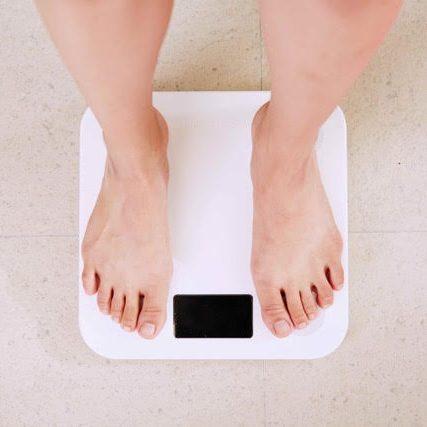1) Juicing
What we think happens:
By consuming only juices for 3 to 10 days we limit our calorie intake so the number on the scale will drop. At the same time, we nourish our bodies with tons of minerals and vitamins and flush out those toxins we accumulated over the years.
What really happens:
The number on the scale goes down not because you lost some actual fat, but because your body lets go of some water. Once you go back to solid food after the juicing period, the number goes back up. On top of that, juices extract the water and the fructose of fruits and veggies but put all the fiber to garbage – so basically you are sipping on sugared water.
What to do instead:
To help your body with its natural detox, make sure to add lots of green vegetables to your diet.
Want to learn more about juicing, read this interview with nutritionist Kayla Williams.
2) Laxatives
What we think happens:
The laxatives will speed up the digestion of our food preventing the absorption. Thus, the calories are just flushing through and we will lose weight whilst eating whatever we want.
What really happens:
Laxatives take over the peristaltic work of your gut, which turns the digestive system into a lazy couch potato making you more and more reliable on laxatives. Even worse, you prevent nutrients from entering your bloodstream resulting in a nutrient deficiency.
What to do instead:
Feed your gut with high fiber foods such as vegetables, fruits, legume, whole grains and fermented foods (kimchi, sauerkraut, kombucha).
Read more about gut health in this article from mind body green
3) Skipping meals
What we think happens:
By skipping meals you eat fewer calories, hence you are going to lose weight.
What really happens:
When skipping meals, you are depriving your body of the necessary energy, which it will crave for at a later stage. As a result, you’ll either overeat at other meal times or crave for simple sugars in between.
What to do instead:
Have three balanced main meals containing vegetables, complex carbs, lean protein and healthy fats. That way you are ensuring a stable blood sugar level that keeps you energized throughout the day.
Read more about the effects of skipping meals here.
4) Over-exercising
What we think happens:
The more intense and often you exercise, the more calories you burn and the more weight you’ll lose.
What really happens:
Exercising does help your weight loss but sometimes less is more. Exercising at an intense level several times a week adds stress to your body leaving cortisol (stress hormone) levels elevated. If you don’t schedule rest time for your body, raised cortisol levels will prevent fat loss and even though you are working your butt off at the gym, you don’t see any change.
What to do instead:
A combination of weight training, high-intensity interval training (e.g. spinning, circuit training, Bootcamp, Crossfit) and low impact training (e.g. walking, swimming) will give your body enough time to recover and your muscles time to grow.
Read more about over-exercising here.
5) Crash diets
What we think happens:
You stick to a very low-calorie diet for just 30 days and you’ll perfectly fit into your new dress by the end of the month.
What really happens:
Crash diets might work for the given period of time and you’ll look stunning in your new dress/bikini. But as soon as the diet period is over, you’ll go back to your old habits, eat more calories and in a second you are back at your starting weight (or even higher)
What to do instead:
Losing weight should never be rushed. It’s a slow process which involves habit changes and patience. Reduce your calorie needs by maximal 500kcal per day and give yourself time. Enjoy the journey and don’t be too fixated on the end goal.
What are the diets you should follow? Paleo, vegan, plant-based, low carb or ketogenic? There is no one solution that fits everyone but all these diet trends have a few things in common. They all promote high vegetable consumption and staying away from highly processed food and sugar. As a starting point let me give you the following tips
- Drink at least 3 liters of plain water every day
- Start every meal with your vegetables
- Include leafy green vegetables at least in one meal a day
- Reduced processed, refined and deep-fried food from your diet and stick to real food
- Reduce sugar
- Move your body regularly
Don’t expect a miracle to happen over-night. One salad is not going to reduce your weight, you have to make it your lifestyle. Be patient and enjoy the journey to a healthier and happier you. If you need support in your health journey, get in contact with me and we’ll work together towards your goal.[/vc_column_text][vc_custom_heading text="About me" font_container="tag:h3|text_align:left" use_theme_fonts="yes"][vc_row_inner][vc_column_inner width="1/4"][vc_single_image image="30432" img_size="medium"][/vc_column_inner][vc_column_inner width="3/4"][vc_column_text]I’m Dominique, a health and nutrition enthusiast who loves to bake. With my company, nurture your happiness, I want to show people that a healthy diet is more than just salad and that eating should be joyful. For years I struggled with an eating disorder and over-exercising but with trust and time, I managed to find a balance in my life.
You can read my full story here.[/vc_column_text][/vc_column_inner][/vc_row_inner][/vc_column][/vc_row]












